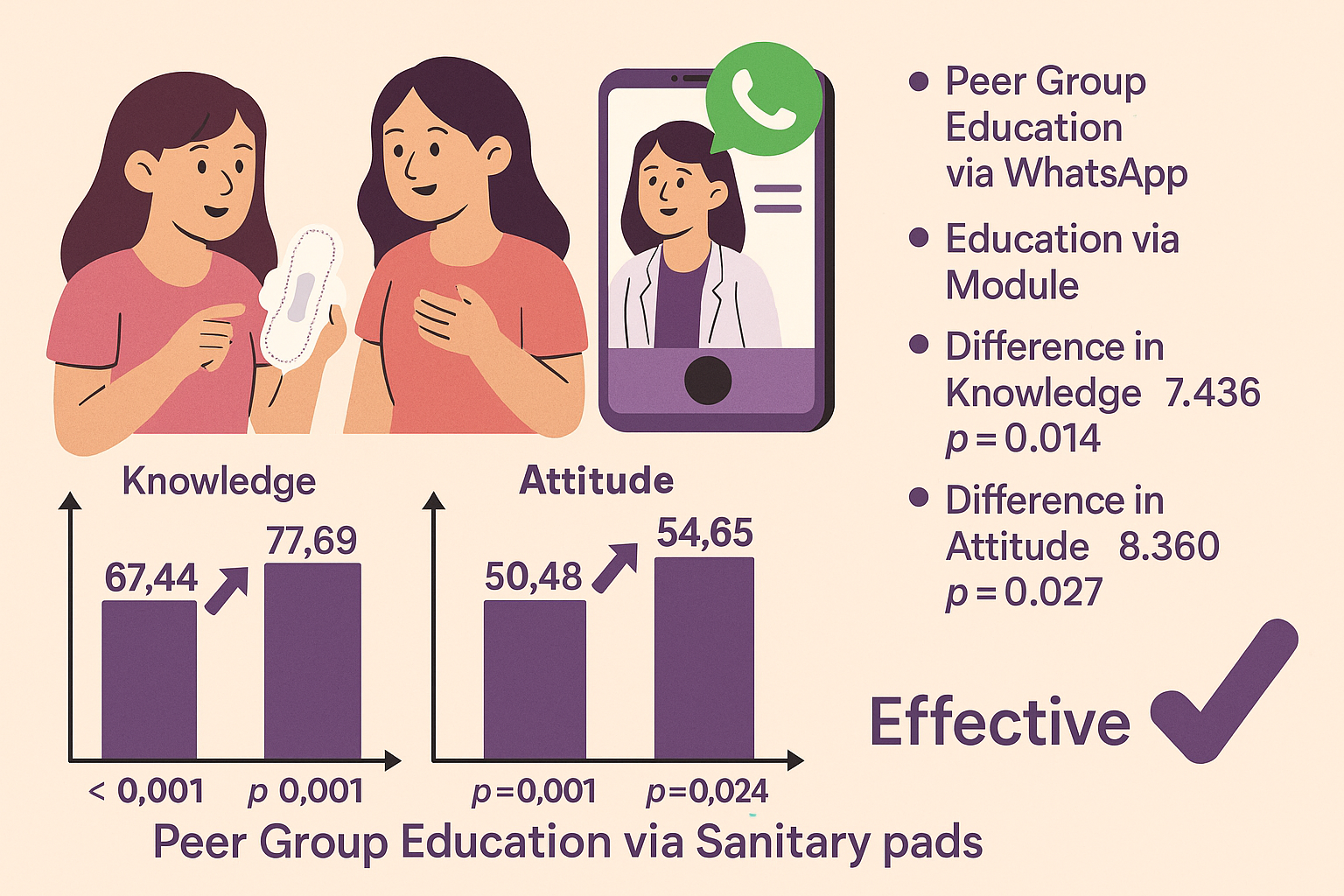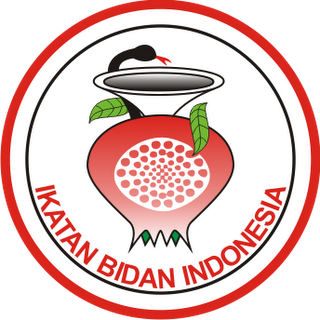Peer Group WhatsApp Can Enhances Knowledge And Attitude About Sanitary Pads in Adolescent Girls
https://doi.org/10.33860/jbc.v7i1.3176
Keywords:
adolescent, education, menstruation, peer group, sanitary padAbstract
Introduction: Currently, many women still do not know what kind of pads are safe to use. Errors in choice and use of pads can hurt reproductive health. Purpose: Knowing the influence of peer group education WhatsApp (PGEW) on promoting knowledge and attitude (KA) about sanitary pads. Methods: The type of research is a quasi-experiment pre-and post-test with a control group; the samples are 30 people in each group; the sampling technique is consecutive sampling; Data of (KA) have been collected by filling out questionnaires, and research has been conducted for 3–4 months Education in the intervention group is done via WhatsApp, while education in the control group is done via a module. The statistical test used T-Independent test. Results: There was an increase in the average knowledge of 10.26 from (67.44-77.69, p-value <0.001), and there was an increase in the average attitude of 4.18 from (50.48-54.65, p-value 0.024). Independent T-tests showed that there was a difference in average knowledge around 7.436 (p-value 0.014< α 0.05) and there is a difference in average attitude around 8.360 (p-value 0.027< α 0.05). Conclusion: The PGEW method is effectively used to improve the (KA) of adolescents about sanitary pads.
Downloads
References
Astutiningrum, D., Desi, L., Utami, A., & Riyanti, E. (2021). Increasing knowledge and attitude of menstrual hygiene with health education using the peer group method in adolescents pengetahuan dan sikap menstrual hygiene dengan pendidikan kesehatan menggunakan metode peer group pada remaja. Prosiding 14th Urecol: Seri Kesehatan, 650–660. http://repository.urecol.org/index.php/proceeding/article/view/1634
Ayu, M., Ningrum, C., & Indriyanti, D. R. (2018). The influence of knowledge, attitude, family support and peer support on the behavior of female teenage menstrual hygiene. Public Health Perspective Journal, 3(2), 99–107. https://journal.unnes.ac.id/nju/index.php/phpj/article/view/15148
Azwar, S. (2013). Sikap Manusia: Teori dan Pengukurannya. Pustaka Belajar.
Desvi, O. T. (2019). Analisa kadar klorin pada pembalut wanita dari berbagai merk yang dijual eceran di jalan pimpinan medan [Poltekkes Kemenkes Medan]. https://digilib.unila.ac.id/28054/
Doda, D. V., Assa, Y. A., & Kaseke, M. M. (2021). Peningkatan pengetahuan masyarakat tentang pencegahan Covid-19 melalui program kemitraan masyarakat. VIVABIO: Jurnal Pengabdian Multidisiplin, 3(2), 1. https://doi.org/10.35799/vivabio.3.2.2021.32559
Latif, M. Z., Hussain, I., & Atif, M. (2019). Use of Smart Phones and Social Media in Medical Education : Trends , Advantages , Challenges and Barriers. 27(2), 133–138. https://doi.org/10.5455/aim.2019.27.133-138
Latifah, N. (2017). Gambaran perilaku hygiene menstruasi pada siswi SMKN 8 Kota Bekasi. Gambaran Perilaku Hygiene Menstruasi Pada Siswi SMKN 8 Kota Bekasi Noor, 13(1), 35–47. http://digilib.unila.ac.id/id/eprint/28054%0A
Majeed, J., Sharma, P., Ajmera, P., & Dalal, K. (2022). Menstrual hygiene practices and associated factors among Indian adolescent girls : a meta ‑ analysis. Reproductive Health, 19(148), 1–13. https://doi.org/10.1186/s12978-022-01453-3
Mohamadi, S., Garkaz, O., Mousavi, S. A., Keramat, A., Goli4, S., & Motaghi, Z. (2021). The effect of motivational interview on puberty knowledge and practice among adolescent girls. Nursing and Midwifery Studies, 10(1), 13–19. https://doi.org/10.4103/nms.nms
Muna, N. (2023). Hubungan pengetahuan tentang menstrual hygiene dengan perilaku personal hygiene saat menstruasi pada remaja putri SMA. Universitas Islam Sultan Agung.
Nagar, S., Aimol, K. R., Nagar, S., & Aimol, K. R. (2017). Studies of tribes and tribals knowledge of adolescent girls regarding menstruation in tribal areas of meghalaya knowledge of adolescent girls regarding menstruation. 8(1). https://doi.org/10.1080/0972639X.2010.11886610
Noviana, E. (2017). Pengaruh pendidikan kesehatan metode peer group terhadap pengetahuan dan sikapremaja tentang kesehatan reproduksi di SMK PGRI 1 Magetan Kelas XI [Stikes Bhakti Husada Mulia Madiun]. https://doi.org/10.1017/CBO9781107415324.004
Nugroho, N., Hartati, I., . W., & . A. (2019). Pengaruh edukasi menstruasi melalui Whatsapp terhadap self care dismenore pada remaja putri SMA di kota Bengkulu. Journal of Nursing and Public Health, 7(1), 88–93. https://doi.org/10.37676/jnph.v7i1.793
Nul Hakim, L., & Widiastuti, R. (2013). Pengaruh peer group terhadap konsep diri siswa kelas VIII. 1, 1–15. http://digilib.unila.ac.id/id/eprint/28054%0A
Parent, C., Tetu, C., Barbe, C., Bonneau, S., Gabriel, R., Graesslin, O., & Parent, E. R. C. (2021). Menstrual hygiene products: A practice evaluation. Journal of Gynecology Obstetrics and Human Reproduction, 51(1). https://doi.org/10.1016/j.jogoh.2021.102261
Rosmina. (2018). Apakah pengetahuan dan sikap menjadi kontributor utama dalam pembentukan perilaku penggunaan pembalut pada remaja putri di sekolah menengah pertama negeri 2 Tondong Tallasa Kabupaten Pangkep. Jurnal Keperawatan Indonesia, 21(23), 127–138. https://doi.org/10.7454/JKI.V21I2.597
Rosmina, R., Amir, S., Badaruddin, B., & Syafar, A. (2018). Apakah pengetahuan dan Sikap menjadi kontributor utama dalam pembentukan perilaku penggunaan pembalut pada remaja putri di daerah pedesaan Kabupaten Pangkep? Jurnal Keperawatan Indonesia, 21(3), 127–138. https://doi.org/10.7454/jki.v21i2.597
Saraswati, P. S. (2019). Pengaruh media Whatsapp dan leaflet terhadap perilaku pemeriksaan payudara sendiri pada siswi sekolah menengah atas di kota Kendari. Al-Sihah :Public Health Science Journal, 11(2), 107–117. https://journal3.uin-alauddin.ac.id/index.php/Al-Sihah/article/view/9662
Sinaga, E., Saribanon, N., Suprihatin, Sa’adah, N., Salamah, U., Murti, Y. A., Trisnamiati, A., & Lorita, S. (2017). Manajemen Kesehatan Menstruasi. Universitas Nasional, IWWASH dan Global One. https://eprints.triatmamulya.ac.id/1485
Soedarsono, D. K., & Wulan, R. R. (2017). Model komunikasi teman sebaya dalam pembentukan identitas diri remaja global melalui media internet. Aspikom, 3(3), 447–456. http://dx.doi.org/10.24329/aspikom.v3i3.172
Sommer, M., Caruso, B. A., Sahin, M., Calderon, T., & Cavill, S. (2024). A time for global action : Addressing girls ’ menstrual hygiene management needs in schools. Lmic, 1–9. https://doi.org/10.1371/journal.pmed.1001962
Sulianti, A., & Arafah, S. M. (2019). Interaksi pengetahuan dan perceived severity kanker serviks dengan perilaku pemilihan pembalut mahasiswi. Psympathic : Jurnal Ilmiah Psikologi, 6(1), 53–64. https://doi.org/10.15575/psy.v6i1.3493
Wihdaturrahmah, & Chuemchit, M. (2023). Determinants of menstrual hygiene among adolescent school girls in Indonesia. International Journal of Women’s Health 2023:15, 15(April), 943–954. https://doi.org/10.2147/IJWH.S400224
YLKI. (2015). Siaran pers YLKI: Hasil uji YLKI, pembalut dan panty liner mengandung klorin.

Downloads
Published
How to Cite
Issue
Section
License
Copyright (c) 2025 Asmawati, Yohana Dewi Abriani, Mardiani (Author)

This work is licensed under a Creative Commons Attribution-ShareAlike 4.0 International License.
Authors who publish with Jurnal Bidan Cerdas agree to the following terms:
- Authors retain copyright and grant the journal right of first publication with the work simultaneously licensed under a Creative Commons Attribution License (CC BY-SA 4.0) that allows others to share the work with an acknowledgment of the work's authorship and initial publication in this journal.
- Authors are able to enter into separate, additional contractual arrangements for the non-exclusive distribution of the journal's published version of the work (e.g., post it to an institutional repository or publish it in a book), with an acknowledgment of its initial publication in this journal.
- Authors are permitted and encouraged to post their work online (e.g., in institutional repositories or on their website) prior to and during the submission process, as it can lead to productive exchanges, as well as earlier and greater citation of published work.

This work is licensed under a Creative Commons Attribution-Share Alike 4.0 International License
You are free to:
- Share, copy and redistribute the material in any medium or format
- Adapt, remix, transform, and build upon the material for any purpose, even commercially.
- The licensor cannot revoke these freedoms as long as you follow the license terms.




